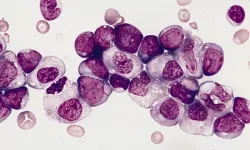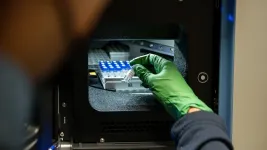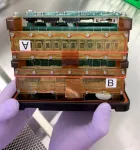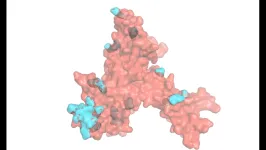(Press-News.org) The whistleblowers who once trusted journalism are losing faith in the institution.
A new study from the University of Georgia found that many whistleblowers who reached out to journalists in the past no longer believe media has the same ability to motivate change, and they feel let down by a system they once trusted.
“If you don’t believe that an outlet or journalist can carry you across the finish line—meaning can affect change, attract enough attention and attract the attention of the right people—then you’re losing faith,” said Karin Assmann, study lead and assistant professor in UGA’s Grady College of Journalism and Mass Communication. “So if you think the institution of journalism no longer has the same impact, maybe because you see algorithms dictate what people pay attention to, then you lose faith.”
Distrust in institutions leads to skepticism
Assmann’s study was inspired by her own career as a journalist and a desire to protect the profession as it undergoes significant change. Assmann spoke with 16 whistleblowers who contacted journalists between the 1970s and 2010s, discussing their decisions to go to the press, their experience during interviews and their reflections on how media has changed.
Although they once believed journalists would protect sources and stories would foster accountability and evoke change, study participants noted the erosion of media’s reach throughout the last several decades.
“Especially with early whistleblowers, I would say through the early 2000s, there would be an emphasis on television,” Assmann said. “People would tune into the evening news, and pay attention to what this whistleblower had to say, trusting that it must be worthy of the audience’s attention if it made it into the evening news.”
But today, many whistleblowers believe consumers are less likely to watch the news or read a newspaper—they’re tuning into YouTube and reading brief push notifications or social posts instead. This, coupled with a loss of faith in institutions, meant that if they had another whistle to blow, they might rely on a different medium to spread the message.
“Another thing about whistleblowers is that their trust in their own institution has been damaged,” Assmann said. “So many of them see journalism as an institution that is equally damaged because they may have an ideology that tells them corporate ownership dictates how news is spread, the same way that maybe corporate ownership is responsible for whatever they’re blowing the whistle on.”
A lack of resources impacting newsrooms
Assmann’s study also cataloged the care with which whistleblowers selected journalists. They sought individuals with an established byline, experience reporting on specific topics and a dedicated audience.
“The whistleblowers talked about individuals plus institutions. Jeff Wigand, for example, was really strategic,” Assmann said, highlighting the former tobacco executive who reported that chemicals were added to a tobacco blend to increase the nicotine’s effect. “He looked at ‘60 Minutes,’ looked at the ratings. He knew the program was going to reach millions of people.”
Another example from the study was Tom Drake, who exposed excessive spending at the National Security Agency in 2010.
Drake relied on anonymity for his own safety, and he sought out a specific journalist who would understand the nuances of encryption and the intelligence community in order make sure his report was understood and well-reported.
“He had to find somebody who understood encryption, who would buy into all of the safeguards he had set up in order to share what he had to share without being found out,” Assmann said. “That is an extreme example, but other people follow that same logic and choose who they see as a subject matter expert. That kind of expertise is now at risk, I would say, in the current media landscape.”
Now, reporters are stretched thin and more likely to cover multiple topics.
“You’ll often start working at a news organization, and maybe you’ll have a beat, but you’ll also have to do 100 other things,” Assmann said. “How are you supposed to build trust? How are people supposed to recognize you as somebody who is a subject matter expert?”
Trending lack of trust
There are several factors at hand in waning faith in media, including shrinking newsrooms and a growing gap between communities and journalists. And in a world where more consumers rely on quick articles—or just headlines—to stay up to date, newsrooms need to become better resourced to rebuild trust.
“My suspicion, and I don’t think I’m alone with that, is that there is a crisis in local news,” Assmann said. “People don’t meet journalists in their everyday life anymore. Normal citizens don’t find themselves represented in local broadcast or the local paper.”
Continued research, however, can highlight opportunities to support newsrooms and rebuild some of that trust to combat negative perceptions, Assmann said.
“There’s a mistrust in the news media that’s been fostered, I would say, in the last couple of years through some politicians who have something to gain from the news media losing credibility,” Assmann said. “So I think this is a huge construction site for us to work on as journalism scholars and as journalists.”
If things continue along the same trajectory, whistleblowers could start turning to alternative forms of media to share their stories. Many interviewees in the study reported having greater trust for alternative news sources—blogs or social media—than traditional media.
But Assmann is wary of fully attributing this shift to mistrust.
“I would say that rather than calling it mistrust, it reflects them being media savvy and understanding how media networks work and audiences work,” she said. “The new, modern whistleblower may be born out of mistrust for mainstream media and just figures out that these are the best ways to get their stuff out of there. Maybe the next whistleblower will say, ‘I’ll make it a TikTok video,’ if, you know, TikTok is even still around.”
END
Whistleblowers losing faith in media impact
Study shows that as newsrooms shrink, so does the trust of some former sources
2023-03-07
ELSE PRESS RELEASES FROM THIS DATE:
STEP Demo pilot plant achieves supercritical CO2 fluid conditions
2023-03-07
SAN ANTONIO — March 7, 2023 —The Supercritical Transformational Electric Power (STEP) Demo pilot plant, a $155 million, 10-megawatt supercritical carbon dioxide (sCO2) test facility at Southwest Research Institute (SwRI) in San Antonio, developed in partnership with GTI Energy and GE Research and sponsored by the U.S. Department of Energy, has successfully achieved its first operation with CO2 at supercritical fluid conditions in its compressor section. This accomplishment represents significant progress toward ...
Splicing deregulation detected and targeted in type of childhood leukemia
2023-03-07
Pediatric acute myeloid leukemia or pAML is a childhood blood cancer, one that has proved confounding to clinicians and researchers, with a high relapse rate and relatively few identified genetic mutations (compared to the adult version) that might explain its cause.
In a new study, published in the March 7, 2023 issue of Cell Reports, an international team led by scientists and physicians at University of California San Diego School of Medicine deployed an array of analytical and gene-splicing tools to parse more deeply the mysteries of mutation in pAML.
“Compared to adult AML, pediatric AML is associated with relatively ...
Synchronizing to a beat predicts how well you get ‘in sync’ with others
2023-03-07
How well you synchronize to a simple beat predicts how well you synchronize with another mind, according to a new Dartmouth study published in Scientific Reports.
Previous work has demonstrated that the pupil dilation patterns of speakers and listeners synchronize spontaneously, illustrating shared attention. The team set out to understand how the tendency to synchronize in this way may vary at the individual level and generalize across contexts, as it has been widely debated whether one form of synchrony bears any relationship to another.
“We were ...
How high altitude changes your body’s metabolism
2023-03-07
SAN FRANCISCO, CA—March 7, 2023—Compared to those of us who live at sea level, the 2 million people worldwide who live above 4,500 meters (or 14,764 feet) of elevation—about the height of Mount Rainier, Mount Whitney, and many Colorado and Alaska peaks—have lower rates of metabolic diseases such as diabetes, coronary artery disease, hypercholesterolemia, and obesity.
Now, researchers at Gladstone Institutes have shed light on this phenomenon. They showed how chronically low oxygen levels, such as those experienced at high elevation, rewire how mice burn sugars ...
Endocrine Society elects Newell-Price as 2024-2025 President
2023-03-07
Endocrine Society members elected John Newell-Price, M.D., Ph.D., F.R.C.P., as its 2024-2025 President. He will serve as President-Elect for a year beginning in June 2023 before becoming President in June 2024.
Newell-Price is Professor of Endocrinology at the University of Sheffield in Sheffield, United Kingdom. He also is head of the endocrinology service at the Sheffield Teaching Hospitals NHS Foundation Trust and of the European Neuroendocrine Tumor Society at the hospital.
Newell-Price’s clinical expertise ...
Genetic and socioeconomic factors interact to affect risk of type 2 diabetes and obesity
2023-03-07
BOSTON – New research led by investigators at Massachusetts General Hospital (MGH), a founding member of Mass General Brigham (MGB), indicates that socioeconomic and genetic factors likely interact in an additive way to affect people’s risks of developing obesity and type 2 diabetes. The findings, which are published in Diabetes Care, suggest that interventions to improve socioeconomic deprivation may decrease metabolic diseases at the individual and community levels, especially among people with concomitant high genetic risk.
Genetic and socioeconomic factors—one intrinsic and unmodifiable and ...
Heart tissue heads to space to aid research on aging and impact of long spaceflights
2023-03-07
Note: Johns Hopkins Medicine researchers Deok-Ho Kim and Devin Mair will participate in a NASA teleconference for journalists on Tuesday, March 14, at 11 a.m. ET.
Johns Hopkins Medicine researchers are collaborating with NASA to send human heart “tissue-on-a-chip” specimens into space as early as March. The project is designed to monitor the tissue for changes in heart muscle cells’ mitochondria (their power supply) and ability to contract in low-gravity conditions.
The tissue samples will ...
Heart toggles between maintenance and energy-boost mode using ribosomes
2023-03-07
Researchers at the Centre for Genomic Regulation (CRG) in Barcelona have discovered a mechanism involving ribosomes which helps the heart toggle between a ‘regular maintenance mode’ for day-to-day function and an ‘energy-boost mode’ which aids recovery for high-demand situations including heart attacks. The findings are published in a ‘Breakthrough Article’ in the journal Nucleic Acids Research, a distinction awarded to studies that answer long-standing questions in the field.
Ribosomes are the molecular factories that manufacture proteins in all living cells. Historically, they have been ...
NYU Langone orthopedic surgeons present latest clinical findings & research at AAOS 2023
2023-03-07
Experts from NYU Langone Orthopedics will present their latest clinical findings and research discoveries at the 2023 American Academy of Orthopaedic Surgeons (AAOS) Annual Meeting, March 7 to 11, in Las Vegas.
Topics being presented include the following:
minimally invasive in-office needle arthroscopy to diagnosis and treat a common cause of chronic ankle pain
improving postoperative pain with intraoperative injections during hip fracture surgery
using an additional dose of dexamethasone to reduce postoperative opioid use for pain after knee replacement
“Our clinical teams continue to innovate and investigate how we can provide our patients with the best possible outcomes. ...
Teacher supports, guidance for elementary social studies education vary widely across U.S., report finds
2023-03-07
A new RAND Corporation report finds that the basic infrastructure to support elementary (grades K-5) social studies instruction – academic standards, accountability requirements, assessment programs – is inadequate in many states. Even where state-level infrastructure to guide teachers’ instruction is in place, its comprehensiveness and quality vary greatly.
Support and guidance at the district and school level to underpin social studies instruction are also lacking compared to other core academic ...
LAST 30 PRESS RELEASES:
ASU researchers to lead AAAS panel on water insecurity in the United States
ASU professor Anne Stone to present at AAAS Conference in Phoenix on ancient origins of modern disease
Proposals for exploring viruses and skin as the next experimental quantum frontiers share US$30,000 science award
ASU researchers showcase scalable tech solutions for older adults living alone with cognitive decline at AAAS 2026
Scientists identify smooth regional trends in fruit fly survival strategies
Antipathy toward snakes? Your parents likely talked you into that at an early age
Sylvester Cancer Tip Sheet for Feb. 2026
Online exposure to medical misinformation concentrated among older adults
Telehealth improves access to genetic services for adult survivors of childhood cancers
Outdated mortality benchmarks risk missing early signs of famine and delay recognizing mass starvation
Newly discovered bacterium converts carbon dioxide into chemicals using electricity
Flipping and reversing mini-proteins could improve disease treatment
Scientists reveal major hidden source of atmospheric nitrogen pollution in fragile lake basin
Biochar emerges as a powerful tool for soil carbon neutrality and climate mitigation
Tiny cell messengers show big promise for safer protein and gene delivery
AMS releases statement regarding the decision to rescind EPA’s 2009 Endangerment Finding
Parents’ alcohol and drug use influences their children’s consumption, research shows
Modular assembly of chiral nitrogen-bridged rings achieved by palladium-catalyzed diastereoselective and enantioselective cascade cyclization reactions
Promoting civic engagement
AMS Science Preview: Hurricane slowdown, school snow days
Deforestation in the Amazon raises the surface temperature by 3 °C during the dry season
Model more accurately maps the impact of frost on corn crops
How did humans develop sharp vision? Lab-grown retinas show likely answer
Sour grapes? Taste, experience of sour foods depends on individual consumer
At AAAS, professor Krystal Tsosie argues the future of science must be Indigenous-led
From the lab to the living room: Decoding Parkinson’s patients movements in the real world
Research advances in porous materials, as highlighted in the 2025 Nobel Prize in Chemistry
Sally C. Morton, executive vice president of ASU Knowledge Enterprise, presents a bold and practical framework for moving research from discovery to real-world impact
Biochemical parameters in patients with diabetic nephropathy versus individuals with diabetes alone, non-diabetic nephropathy, and healthy controls
Muscular strength and mortality in women ages 63 to 99
[Press-News.org] Whistleblowers losing faith in media impactStudy shows that as newsrooms shrink, so does the trust of some former sources




